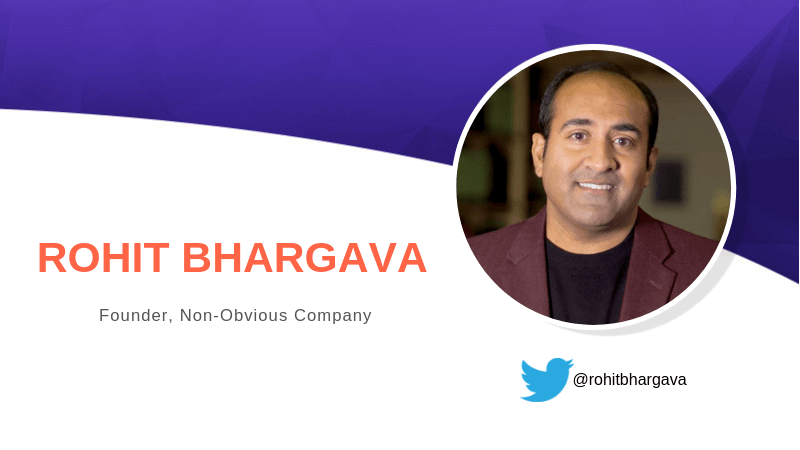Q&A with Jeff Ganim: Advancing Quality Content and Avoiding Digital Clutter
Reputation Staff Writer


Jeff has become a digital marketing expert through education and experience in cutting-edge strategies. Follow him on LinkedIn or visit his website, ri-deem digital.
How did you get to be a content marketing and SEO specialist?
Because I love learning and am a naturally inquisitive person, my original goal was to become a professor. I noticed that, even though my professors had brilliant ideas, they struggled to get those ideas out into the world apart from academia. In college, I built some websites to get my own ideas out, found a social media following and started to grow. I realized doing that helped me reach more people than my professors had.
When some famous people and even some of my heroes started interacting with the content, I took a social media marketing course at Rutgers and started to volunteer in the field to get more experience. I ended up working in-house at a financial planning company doing all their digital marketing and then moved into working with businesses of all sizes, from small firms to a billion dollar company.
What do you consider digital clutter and how can brands avoid it?
Digital clutter is content that is created just for the sake of creating content. Some companies think they need content because “Google likes content,” or ”Google likes when you post a lot,” or some notion like that. In reality, most platforms have too much content, as opposed to content that’s really good and meets a company’s objectives and needs.
Every piece of content needs to fit into an overall strategy, whether it’s to reach people or some other goal of the business. Interviews like this one we are doing right now are a great source of content that gets the word out in a broader way because both the subject and the company sponsoring the interview share it with their audience.
What are the advantages of using a third-party agency for branding and digital marketing?
In many cases, it is more cost-effective to pay a monthly fee to a third-party agency than to hire the staff a company needs in-house to handle digital marketing.
The digital marketing industry has grown so quickly that universities have really fallen behind in educating people for the new economy. That means it’s hard to find good people who can do digital marketing, and it’s easier to hire an agency where that expertise has been developed, often by experience rather than education.
On the branding side, it’s also helpful to get different opinions, and someone on the outside of an organization can sometimes be more objective and help people think differently than they otherwise might.

What is the current state of content marketing? How does it need to change?
Content is no longer king. When it is successful, it is a link in a chain. Previously, there was not a lot of great content out there, so when you created great content, marketing would take care of itself. Now content is so common that you need other ways to move things along and get your message across.
For example, if you create great content on your website but it has no authority, it’s difficult to rank on Google. If you create great social media posts, but you don’t have a connection to your audience, your content will probably not be shared by very many people. If your brand is not authentic, your content is not going to build the customer relationship you want, no matter how good it is.
Has your business seen any impacts from the current coronavirus outbreak, and how can marketers respond effectively to the current threat and the shutdowns it has caused?
I think all marketing agencies have seen at least some impact from the coronavirus outbreak. However, we have been fortunate that we have a diversified client base and long-term relationships with many of our clients (some over a decade that predates our company). We’ve also actually seen people signing new deals in this environment. Some businesses are seeing increased traffic and sales with more people at home and searching online.
I think the best advice for marketers during this time comes from one of the best crisis managers of all time, Abraham Lincoln. He said, “Let us have faith that right makes might.” In this crisis, we are seeing many businesses do the right thing, and their brands are benefitting from it.
Visa CEO Alfred F. Kelly, Jr. promised not to lay off any employees this year and his post got over 160,000 likes on LinkedIn. That develops the kind of positive sentiment for a brand that an advertisement never could. Many other brands are helping out during this crisis by making masks and hand sanitizer, and they’re seeing similar results.
The best way to succeed in business is to do the right thing. Cutting corners and taking advantage of people leads only to short-term success, and that is especially true during a crisis. People want to see that you are human, that you care, and they will reward you with likes, shares and positive sentiment that will translate to future purchases.
We are all in this together, and we are looking for someone to root for. Do the right thing, and people will root for your brand. There’s nothing greater a marketer could do for their brand.

How does SEO fit into an overall digital marketing strategy?
Google’s face to the SEO community John Mueller said that Google’s quality rater guidelines—the document Google uses to evaluate its own algorithm—are “a guide to where SEO is going, not where it is right now.” The document emphasizes EAT—expertise, authority and trust. What I see Google doing is leaning more toward ranking trusted experts on a topic and not just people who make great content. Going forward I think the name and the reputation of the person behind the content are only going to become more important.
Right now we are seeing this in the healthcare industry, where traditional health sites with medical doctors reviewing the content are seeing a huge boost, while nontraditional sites have really been struggling as far as search engine rankings, hits, etc.
How does Google My Business impact online reputation?
Google My Business is where businesses manage their Google Maps page, and it can be more important for a lot of local businesses than their website. Google Maps show above other search results, and a large number of people stop right there and don’t go any further to the actual search results, such as the business’s website.
Some businesses have not even claimed their Google My Business page, which they really need to do as part of their digital marketing strategy. It’s hard to rank on Google if Google doesn’t even know for sure that the business is owned by someone, is active and so forth. Of course, there is the reputation piece that includes reviews, so it’s always good to be active there, try to get good reviews and improve ones that aren’t so good.
How can companies use Google My Business to benefit their brand?
After you claim your page, you can add offers, make posts just like social media, upload photos and videos and respond to reviews. Choosing your business category is important for search rankings. It’s almost like a social media page, so it’s important to be active on the page and keep it up-to-date.
Right now, it can be difficult to know which businesses are open or closed, so updating the Google My Business page can be a good way to keep customers in the loop and make sure they know when you are open, whether they can shop in-store or order for pickup, or any other changes that are taking place.
Access our COVID-19 Resource Page today to see how Reputation.com can help your business.









